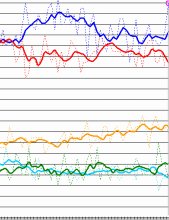Why Religion May Not Matter Much in 2008, Part 2

For three days last week, I got my chance to do what I love most: hang out with fellow religion writers and talk/listen/think obsessively about the latest religious news and issues. It was the Religion Newswriters Association annual conference, held this year in D.C. (Melissa Rogers has rounded up the excellent blog coverage by fellow reporters; complete audio will be available at the RNA website shortly, and some of the videos are on YouTube already.)
But here was the strange thing: While we were slicing and dicing the religious categories du jour - “young evangelicals” and the religiously unaffiliated — the financial world was falling apart. If we were a conference of business writers, our gathering would have been canceled. Our beat, apparently, is millions of light years away from Wall Street. The result sometimes struck me as tragi-comic: As we puzzled over minute changes in the political affiliations of, say, non-Latino Catholics who regularly attend church, the entire landscape of our nation was shifting.
This spectacle, in which I took full part, took me back to a post I wrote almost exactly a year ago, “Why Religion May Not Matter Much in 2008.” I quoted some figures from the Pew Forum, which showed that for most voters, “social issues” — basically a code word for gay marriage and abortion — ranked far below the war in Iraq and domestic issues (like the economy) in importance. One can only imagine that the economy has rocketed to the top of people’s concerns, and if the firewall of the current bailout doesn’t manage to contain the financial disaster, and us non-Wall-Street-employed people start to feel the direct pinch, this will probably only become more true.
When John Green, a top analyst of religion and politics from the University of Akron, offered us his very latest stats on religion in the election landscape, one reporter (I wish I could remember who) Bruce Nolan of New Orlean’s Times-Picayune asked a great question along the lines of: Do religious groups interpret a bad economy in different ways? Or as Bruce himself recalled it just now via e-mail, “As fear mounts and climbs toward panic, do we all vote OUR OWN pocketbooks, dropping into a me-first defensive crouch?”
Green had no handy answer, but this question may represent our last hope as religion writers in having something relevant to say in this election. The common wisdom is that when the economy goes bad, incumbents lose. And if Obama is successful in branding McCain as a continuation of the Bush administration, then that may be the simple explanation of who wins in November.
But that reporter might be on to something. Do religious groups interpret the economy differently? If so, then the religious divides that separate us in other issues may be relevant here as well. Are some groups more fatalistic, for example, perhaps seeing the Wall Street implosion as an act of God for which the government should not be held responsible? Are others more likely to blame generalized “sin,” such as greed or dishonesty, and call all Americans to moral renewal? John Green told me after his talk this Friday that his research focuses on religious affiliation because it is the most predictive of voting behavior. So do evangelicals or mainline Protestants or Catholics tend to favor different economic policies or different styles of economic leadership?
It’s probably too late to start this sort of research, as the election is less than two months away. But I did meet at least one religion reporter who is in a good position: Bob Smietana, a reporter at Nashville’s The Tennessean, is co-author of the 2008 book, Good Intentions, which looks at religious views on topics like gas prices, capitalism, CEO compensation and poverty. Looks like Bob has a jump on the rest of us.
Related reading (via Romenesko): Eric Boehlert at Media Matters on why the media obsession with the campaign meant financial and economic news was relegated to the back pages — until it was too late.

Comment by DH on 23 September 2008:
Great question…how do religious perspectives impact voting based upon economic indicators - as always, you raise thought-provoking issues of the day! Religion certainly seems to be playing a visible role in today’s election…to the chagrin of most Americans, I think.
Nicholas Kristof’s 9/21/08 Sunday Opinion piece about “The Push To ‘Otherize’ Obama” was a chilling assertion that religious prejudice could be an excuse for racial prejudice - so perhaps the gut prejudice card is being played while ignoring the economic mess that this country is in - only the results of Nov. 4 will reveal which topic was of more importance to the average voter. V. sad state of affairs to admit that anti-Muslim sentiments/rumours may rule the day!
Pingback by Where Do Evangelicals Stand on CEO Compensation? : ReligionWriter.com on 24 September 2008:
[...] the spirit of this week’s question of how different religious groups relate to the massive financial troubles on Wall Street, I spent [...]
Comment by Nasamat on 29 September 2008:
” the entire landscape of our nation was shifting.”
All nations go through ups and downs.
“and us non-Wall-Street-employed people start to feel the direct pinch,”
That’s why I wrote ‘Patience’. See blog above.